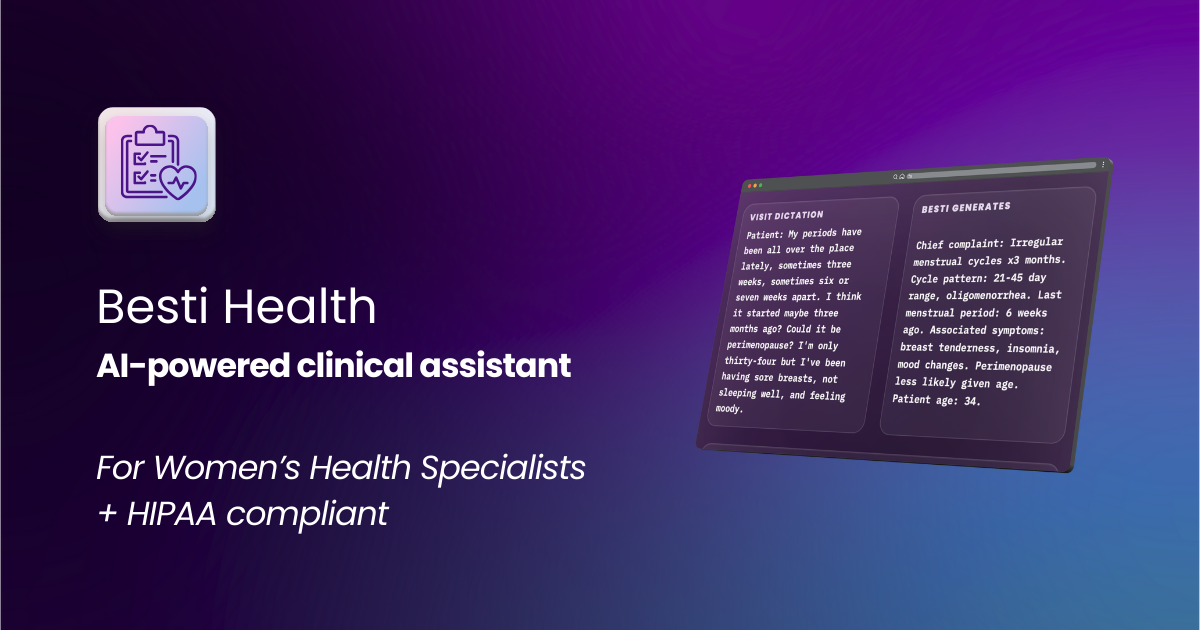Dr. Danielle Mann remembers why she chose women's health—the profound privilege of supporting women through their most vulnerable and transformative moments. From delivering babies to helping patients navigate menopause, she found deep meaning in comprehensive women's care.
But by 7 PM on a Tuesday, hunched over her computer completing the day's documentation, that sense of purpose felt buried under an avalanche of administrative tasks.If this resonates, you're not alone. Women's health providers report some of the highest documentation burdens in healthcare, spending up to 3 hours on notes for every hour of patient care. The complexity of women's health—spanning reproductive, hormonal, and systemic considerations—creates documentation requirements that are both extensive and intricate.

The documentation crisis in women's health extends far beyond late nights at the office. Research shows that administrative burden directly impacts:
Clinical Decision-Making: When providers are mentally calculating how long documentation will take, it influences how thoroughly they explore patient concerns. The fear of "opening a can of worms" that will require extensive documentation can subtly limit the depth of care conversations.
Patient Relationships: The constant mental juggling between being present with patients and remembering what needs to be documented creates a barrier to the deep, trusting relationships that are foundational to women's health care.
Career Satisfaction: A 2024 study found that women's health specialists who spend more than 2 hours daily on documentation are 40% more likely to report burnout symptoms and consider leaving clinical practice.
Work-Life Integration: The "pajama time" phenomenon—completing notes at home in the evenings—disproportionately affects women's health providers, who often have complex family lives themselves.
Women's health documentation isn't just more extensive—it's more complex. Consider a single patient encounter that might include:
Reproductive history spanning decades: From menarche to menopause, each phase requires different documentation approaches
Multi-system interconnections: Hormonal changes affecting cardiovascular, bone, mental, and reproductive health simultaneously
Preventive care protocols: Age-appropriate screening schedules that vary based on risk factors and reproductive status
Psychosocial considerations: Mental health, intimate partner relationships, sexual health, and body image concerns
Regulatory requirements: Detailed contraceptive counseling, pregnancy risk documentation, and screening complianceTraditional documentation methods—whether typing during visits or dictating afterward—struggle with this multifaceted complexity.

The right AI documentation solution doesn't just save time—it fundamentally changes how women's health providers can practice. Here's how:
Enhanced Presence During Visits: When AI handles real-time documentation, providers can maintain eye contact, pick up on subtle emotional cues, and create the safe space that women's health care requires. Dr. Lisa Rodriguez notes, "I finally feel like I can be fully present when a patient is sharing something deeply personal, instead of worrying about how to document it all accurately."
Comprehensive Care Capture: Advanced AI designed for women's health automatically recognizes the interconnections between different aspects of a patient's health. It doesn't just capture that a patient mentioned fatigue—it contextualizes it within their contraceptive use, menstrual cycle, and recent life changes.
Reduced Cognitive Load: The mental effort of simultaneously listening to patients and mentally organizing information for documentation is exhausting. AI eliminates this dual-processing burden, allowing providers to focus entirely on clinical reasoning and patient connection.
Evening Liberation: The most transformative benefit many providers report is getting their evenings back. No more "pajama time" documentation means more time for personal relationships, self-care, and the activities that prevent burnout.
Not all AI documentation solutions are created equal, especially for women's health. The most popular AI scribes were designed for general medicine and often struggle with women's health complexity. When evaluating AI solutions, women's health specialists should prioritize:
Specialized Training: AI trained specifically on women's health encounters understands the nuanced relationships between hormonal status, reproductive health, and systemic symptoms. This means fewer corrections and more accurate initial drafts.
Contextual Awareness: The ability to understand that the same symptom might have different implications based on patient age, pregnancy status, or hormonal phase. Quality AI adjusts its documentation approach accordingly.
Integration Capabilities: Seamless integration with existing EHR systems and workflow patterns. The goal is to enhance your current practice, not disrupt it.
Privacy and Security: Women's health information is particularly sensitive. Ensure your AI solution meets the highest standards for data protection and HIPAA compliance.

The promise of AI documentation isn't just about efficiency—it's about restoration. Restoration of the patient relationships that drew you to women's health. Restoration of the work-life balance that supports long-term career satisfaction. Restoration of the mental energy to stay current with advancing treatments and approaches.
When documentation no longer consumes your evenings and cognitive resources, you can return to what inspired you about women's health care: being fully present for the profound moments in women's lives, from first prenatal visits to supporting patients through health transitions with confidence and compassion.
The technology exists today to transform your practice. The question isn't whether AI documentation will become standard in women's health—it's whether you'll be among the early adopters who reclaim their practice satisfaction, or wait until the administrative burden becomes unbearable.
Your patients deserve your full attention. Your family deserves your presence in the evenings. And you deserve a practice that energizes rather than depletes you. The path forward begins with choosing documentation technology that understands and supports the complex, meaningful work you do every day.